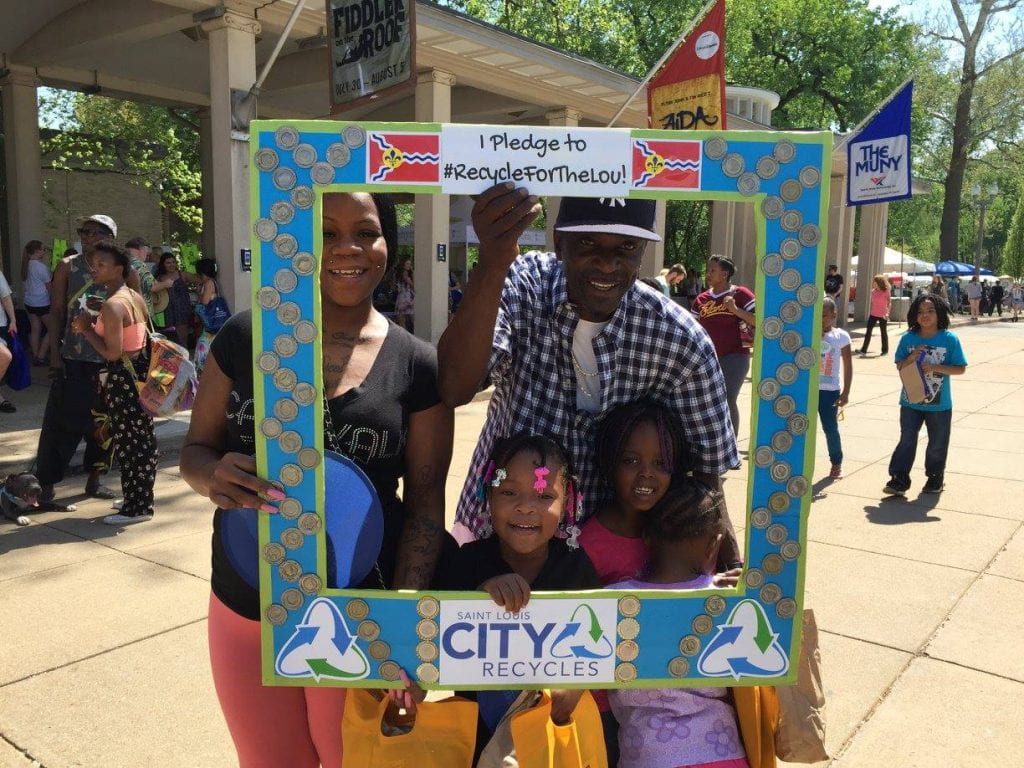As landfills continue to negatively affect both the environment and human health, it is increasingly important for us to take responsibility. Of the many things we can do to decrease our contributions to the landfill, the simplest is to recycle. When recycling, keep recyclable materials clean and dry. Do not put items that aren’t on the list into a recycling bin, as “wishcycling” decreases the value of the good materials and causes problems during the sorting process. Education is the first step when it comes to effective recycling, and there are plenty of resources out there to make that a reality for everyone.
In this second Resource Digest issue, Waste Associate Alexis Tinoco presents STL City Recycles, a hyper-local resource to learn everything you need to know about recycling in the St. Louis region.
In 2015, an outreach and education team called Saint Louis City Recycles (STLCR) was formed under a partnership between Brightside St. Louis and the City of St. Louis to increase community education and resident participation in recycling programs. Four years later, St. Louis City Recycles continues to work hard to “ensure every St. Louis City resident has the knowledge, tools, and motivation to make reducing, reusing, and recycling a part of their daily routine”.
Since the program’s inception in 2015, 2,768 residents have signed their online pledge, joining a mass movement of residents dedicated to reducing the amount of trash St. Louis sends to landfills and encouraging others to do the same. Across its website, STLCR provides a wide variety of resources, ranging from simple waste sorting guides to creating a database to help residents find recycling options for more complicated items like VCRs and hazardous waste that fall outside of the “single stream” recycling system. Since fall 2018, STLCR has also offered in-home recycling bins to all city residents for a small $1 donation. STLCR team members also distribute recycling bins for large groups by request at no extra charge, making the process of obtaining a blue bin as convenient as possible.
Have you ever wondered what happens to your recycling once it is picked up from your home or work? Last January, St. Louis City Recycles published a virtual tour of the sorting facility that processes just over half of the recyclables collected in the St. Louis region, allowing residents to follow their recyclables from the minute it leaves their homes to when it is bailed together and shipped off to be turned into new products. Recycling loads are dumped at the Materials Recovery Facility then swiftly fed onto conveyor belts where employees pull off any contamination they spot, such as food waste, plastic bags, and garden hoses. As the virtual tour continues, it points out the importance of avoiding plastic bags in recycling as workers must pull them off the conveyor belts. The Materials Recovery Facility loses 6.5 hours of productivity every day, “primarily due to plastic bags jamming up the machines”! Workers also have to assume that bagged residential material should be landfilled, as there is no time to check each bag in this fast-paced environment.
The tour also addresses the widespread issue of “wishcycling” – the act of “recycling things you’re not sure about, but hope are recyclable”. Wishcycling can result in contaminated bales which lose their value. Manufacturers do not want to buy bales with visible contamination as this is a sign there is likely more contamination inside.
While recycling may seem complicated at first, it can actually be really simple (and fun!) once you get the hang of it. With the proper resources, anyone can become a true recycling genius. After all, “the more we recycle today, the better off we are tomorrow”.
Resources within the Saint Louis City Recycles website:
The resources below are highlights from the website, however there are even more resources which you can explore on their website here.
- Beyond Your Blue Bin: Regional Recycling Database for Hard-to-Recycle Items
- Closing the Loop: Where to Buy Recycled Goods
- Video: City School on recycling (song included!) – NEW!
- Video: How Does a Materials Recovery Facility Work?
- Downloadable Recycling Guides
- Recycling FAQ
Most of the resources above are relevant across the St. Louis region. However, it is highly encouraged to check in with your local municipality, as some communities utilize different practices to optimize recycling in their area.
Do you have an idea for the Resource Digest Series? We would love to hear it! Email the name of your resource and any other relevant details or links to sustainability@wustl.edu with “Resource Digest” in the subject line. Note: we will only select resources that are free and publicly accessible.
